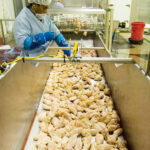Polyethylene terephthalate (PET) is one of the most widely used plastics, commonly found in bottles, fibers, and many other products. It is a unique member of the plastic family as it can be broken down into its constituent units (or monomers) by PETases, which are enzymes that degrade PET. Until now, scientists have discovered a variety of PETases in nature, including from bacteria, Ideonella sakaiensis, and leaf-compost cutinase. These biocatalysts have been modified for industrial applications. Polyethylene terephthalate (PET) is one of the most widely used plastics, commonly found in bottles, fibers, and many other products. It is a unique member of the plastic family as it can be broken down into its constituent units (or monomers) by PETases, which are enzymes that degrade PET. Until now, scientists have discovered a variety of PETases in nature, including from bacteria, Ideonella sakaiensis, and leaf-compost cutinase. These biocatalysts have been modified for industrial applications. Biochemistry Polymers Phys.org – latest science and technology news stories
Novel enzyme profiling method identifies top candidates for plastic recycling










